With a varied list of contributors to Perfecting the Upset, we decided it made sense to start a series of articles where we’d throw out a question to the crew and see how they stand. To start off, what better than to answer a question that most of us try to avoid thinking about:
What is your most heartbreaking moment in sports history?
(Don’t forget to check out our Allegiances table to know our loyalties.)
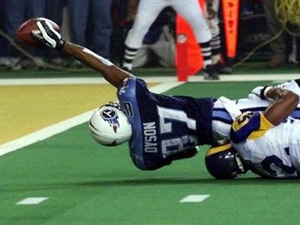 Rahat Ahmed
Rahat Ahmed
Super Bowl XXXIV, January 30, 2000
And that’s how the heart breaks: With the final play of the most important game. With the legitimacy and lore of Earl Campbell, George Blanda and Warren Moon on the line with six seconds left. With the Tennessee Titans trailing “The Greatest Show on Turf” by a touchdown. This was it:
Dyson comes in motion, now resettles. McNair drops, throws right side for Dyson. He dives for the end zone!
He didn’t make it.
He came up one yard short. The Rams win by a yard.
The Titans announcers became quiet. All of us who had stayed loyal to the Oilers after they left town stood still, mouths agape, in shock and dismay. After avenging the Frank Reich comeback from 1993 with the Music City Miracle, we thought we were predestined to win it all, but Kurt Warner and crew had other plans. An incredible game, a grand-standing finale for bystanders, forever etched in the annals of Super Bowl history as one of its most fantastic finishes. But for us, it was nothing short of devastation. Losing isn’t the end of the world, but when it happens by inches, the pain learns to linger on a lot longer.
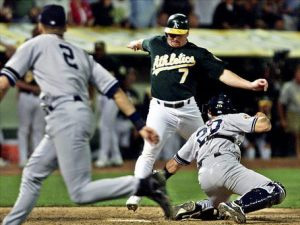 Shaughn Balezentes
Shaughn Balezentes
ALDS Game 3, October 13, 2001
You guys already know the play. Terrence Long doubles down the right field line. Jeremy Giambi tries to score from first. The right fielder makes an errant throw to the cut-off man. Every time I see the replay, I remember the few seconds where it looked like Giambi was going to score the tying run. Those few seconds were an eternity. In those seconds I thought, “This is it! This game is ours!” Then Derek Jeter sprints into the play and casually flips the ball to Jorge Posada.
I’ve never been humbled so instantly.
The real problem with “The Flip” wasn’t so much that the A’s lost that game. I always hear Yankee fans talk about “The Flip” as if it was limited to that specific game. Yankee fans are fucking idiots. “The Flip” forced a Game 4. In Game 4 Jermaine Dye fouled a ball of his shin so hard his bone shattered like plate glass in a Michael Bay film; he’d never be the same hitter again. We lost the series in Game 5. If we had won Game 3, there’s no doubt in my mind that Oakland carries the momentum of a Yankee sweep and wins the World Series. If we win the World Series, maybe Jason doesn’t run to New York that offseason. Maybe we’re able to extend Johnny Damon. We had the pitching. We had the hitting. Maybe we become the most dominant team of the decade.
Of course I’ll never know how it could have been. That’s the tragedy of “The Flip.”
Fuck Derek Jeter.
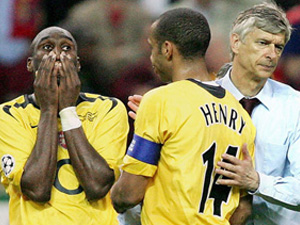 Rob Boylan
Rob Boylan
Champions League Final, May 17, 2006
Arsenal versus Barcelona in the Champions League Final at the Stade de France. The most bittersweet moment of my life. What an amazing run up to the final from an Arsenal point of view, though. It was one that saw Henry score a brilliant goal at the Bernabeu (that later featured in the shitfest Goal 2) in a 1-0 aggregate win over Real Madrid, and after the most perfect Arsenal goal ever against Juventus at Hughbury—Pires stripping the ball from former Arsenal captain Patrick Vieira, shunting it up to Henry, who pushed it on to future captain Cesc Fabregas who pushed the ball low past Juve keeper Gianluigi Buffon—to the last minute penalty save by Jens Lehman against Riquelme at Villareal that I could not physically bring myself to watch, all while setting the record for most consecutive clean sheets (10) and the record for longest time between goals allowed (995 minutes).
The week of the final started in scandal when the original match ref was pictured wearing a Barcelona shirt in a Norwegian paper, and things only went downhill from there. Despite already being despised by the club’s fans, Ashley Cole and Sol Campbell found themselves in the starting XI, where we featured our regular Champions League formation that season, the thoroughly non-Arsenal 4-5-1.
In the 18th minute, Arsenal’s world collapsed when Eto’o went through on goal and was tugged on my Arsenal keeper Jens Lehman, who was red carded for his effort, the goal Giuly scored on the loose ball disallowed. It was the second season in a row an Arsenal player had seen red in a final, after Jose Reyes was shown two yellows in the FA Cup final against Manchester United.
Both teams and both sets of fans, I think, would have preferred Lehmann stay on and the goal stand. Things got ugly from there and had ramifications beyond the match itself. Robert Pires was subbed off to bring on substitute keeped Manuel Almunia, and this was one of the reasons Pires left Arsenal for Villareal. Arsenal drew blood first, in a terribly uncomfortable way, when Emmanuel Eboue dove to get a free kick, which led to a Sol Campbell goal. It was wiped out in the second half when, despite Deco’s consistent diving in the box, it was Henrik Larsson who made all the difference. Eto’o scored in a goal I swear was offside (have not watched it again), and then Beletti scored the winner in a shot that Almunia should have had. Beyond this point is not a blur so much as a blank.
I’ve seen the match only once, live as it happened, and have never been able to watch it since. I had to close my eyes during the opening credits to the 2007 Champion’s League, where they showed that rotten bunch of bastards lifting the cup even. The team that got us to the final was not allowed to play in manager Arsene Wenger’s last ditch attempt to keep both wantaway players, Cole and Campbell, at the club — an effort which failed. Eboue was named defensive player of the tournament, but that was hardly a consolation for the Arsenal fans who have seen nothing but disappointment in the league and Cups since.
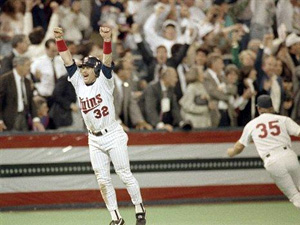 Nick Britton
Nick Britton
World Series Game 7, October 27, 1991
Being a Braves fan in the 80s kind of sucked. They were decent in the early 80s, winning the West Division in 1982 behind Dale Murphy. But it was all downhill from there. The 1990 record: 65-97. In 1991, though, it seemed a bit different. At the halfway point, they were a game under .500. And then they began dominating the West and ended up a game up on the Dodgers for the pennant. The seven game series against the Pirates was a good one and had Drabek not injured himself, we might not be talking about the 1991 Series today. But the Braves won and soon found themselves in the ever-depressing Metrodome for Game 1 of the World Series. This was heaven for me: My favorite team in the World Series. I was the happiest fourteen year old in the world. Some funny stuff happened in that series: Kent Hrbek, the bastard, pulling Ron Gant off first base; Rick Aguilera pinch hitting; Mark Lemke being called a “World Series hero.” By the time Game 6 rolled around, Atlanta was up 3-2, and I was pumped. The pain began in the 11th inning, seeing Kirby Puckett pumping his fists after his game-winning home run. That stands out as the iconic video clip from the 1991 World Series, but Game 7 was the game that mattered.
Here we were: Hometown hero Jack Morris versus John Smoltz, riding high on a brilliant postseason (and pitching against his boyhood idol). And it was truly an epic game. Morris and Smoltz tossed shutouts for eight innings, before Smoltz was removed for Mike Stanton in the eighth and then Alejandro Peña in the ninth. Lonnie Smith was fooled by Greg Gagne and Chuck Knoblauch fake double play, and he only made it to third on Terry Pendleton’s double. He should have scored. And I remember feeling bad, like that was the play that would spell the end of this magical season. And it was. With runners on second and third and no one out, Ron Gant grounded out and Sid Bream grounded into a 3-2-3 double play. The game goes scoreless in the 9th and the Braves do nothing in the top of the 10th, everything went the Twins’ way. Dan Gladden stretched a single into a double. Knoblauch sacrificed him over to third. Peña then intentionally walked both Puckett and Hrbek to load the bases. Gene Larkin hobbled up to the plate and promptly drove one to deep left-center. I remember the feeling, hearing, “The Twins are going to win the World Series!” over the television, but still hoping Brian Hunter would somehow catch the ball (not that it mattered; there was only one out). I can’t even remember how I felt, but I knew that I’d invested way too much in this season for it to end the way it did. I was convinced after the game I’d never see the Braves in the World Series again.
I was wrong of course, there was more heartbreak left to come, but nothing quite like this Game 7.
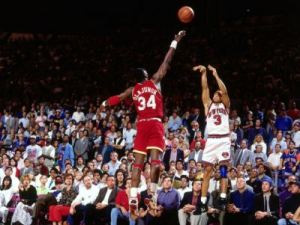 Andrew Feingold
Andrew Feingold
NBA Finals Game 6, June, 19, 1994
The New York Knicks had two chances to win the 1994 NBA Finals. It would have made it their first title since 1973 and third overall in team history. They lost Game 6 86-84, in a game where John Starks scored 27 points. Game 7 was a lot different, Starks shot 2-18 from the field including 0-11 from downtown. He missed all 10 of shots in the fourth quarter as the Knicks lost the game 90-84 and the Finals as well. Ewing shot 42% from the field and was only 3-of-6 from the foul line. Hakeem averaged 25 points in Games 6 and 7, becoming the nemesis. What would have happened if the Dream didn’t block Starks as he shot at the last second in Game 6?
 Bradley Freedman
Bradley Freedman
Regular Season, August 4, 2007
On July 31, 2007, Kyle Davies was traded to the Kansas City Royals from the Atlanta Braves. On August 4 at Old Yankee Stadium, Davies gave up Alex Rodriguez’s 500th career home run in his first start as a Royal. I was there, sitting in the right field stands, not too far from the Bleacher Creatures. (The Creatures are perfectly nice to Royals fans because the Royals pose no actual threat.) From the time I first moved to New York I had been to Yankee Stadium every year when the Royals came into town. I never once saw them win.
When A-Rod hit his homer I thought, “Welcome to the Royals, Kyle Davies.” Or was it actually the other way around? “Hey, Royals: Welcome to Kyle Davies.” In the four years since, he has remained in the Royals’ starting rotation and amassed a statistical record that has legitimate baseball analysts suggesting he may be the worst starting pitcher in baseball history.
In sports, there is one kind of heartbreak that happens when your team comes close to achieving greatness and then it all falls apart. But this was the other kind of heartbreak. It happens when your team is so far from any hint of postseason and has been falling apart for so long that every game feels the same. But then sometimes out of nowhere the team will find a way to fall apart in a slightly different way, because even a slug must occasionally make a left turn. And that different way of failing reminds you how far from glory the team really is.
This wasn’t a communal heartbreak. It was mine alone. It was mine because I was there. Because I had been there the summer before, and the summer before that watching the Royals lose. There is no shame in giving up a homer to A-Rod. But after years of coming to the Bronx with my fellow KC transplants (most of whom had already abandoned the worn-off novelty of Yankee Stadium) I knew my annual visits to Yankee Stadium were over. Welcome to the Royals, Kyle Davis–this is what we do. We are the set-up men for the glory of other teams. Welcome to Kyle Davies, Royals–he’s gonna fit in just fine. We are the guys you catch a glimpse of on SportsCenter, standing with our hands on our hips as the other team’s fans scream with delight. It was that screaming, more than anything, that was the breaking point. As the crowd around me roared I felt embarrassed not by the Yankees, but by the Royals. There were better things to do in New York than watch Kansas City baseball.
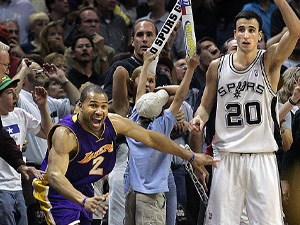 C.D. Hale
C.D. Hale
Western Conference Semifinals Game 5, May 13, 2004
Two words: Point 4. Yep, Derek Fisher did it again, serving up a steaming pile of NBA lore to help set my Spurs’ quest for another NBA championship off-kilter with his off-balance buzzer-beater. Not only that, but it was the Lakers doing the derailing. I’ve never fully gotten over that one, even if the Spurs would later claim two more titles.
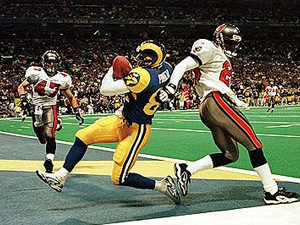 Sean Koo
Sean Koo
NFC Championship, January 23, 2000
In Kurt Warner’s coming out party, the Rams blazed through the regular season and playoffs with “The Greatest Show on Turf” until they hit a brick wall playing against the Bucs’ dominant defense. We held the Rams to five points throughout most of the game, and we seemed to have an answer for everything they threw at us. Even after the Rams scored the only touchdown of the game—a thirty yard strike to Ricky Proehl over Brian Kelly—I felt like we had enough to strike back and take the lead for good. Behind rookie Shaun King, the Bucs actually moved down the field in convincing fashion, but in the final moments a completed pass to Bert Emanual that would have put us at the Ram’s 22 yard line was overturned because the ball touched the ground despite the receiver maintaining possession. We lost the call, the game, and our ticket to the Super Bowl. Afterward, the NFL clarified the rules to basically say the Bucs were robbed. That was a slap in the face to go with the heartache of watching the Rams later win the Super Bowl.
 Masahito Ogasawara
Masahito Ogasawara
Western Conference Finals, May 29, 1997
As a die-hard Rockets fan, it has to be Game 6 of the 1997 Western Conference Finals. First, it was against the Utah Jazz, and every Rockets fan can tell you the pure hatred we all have for the Jazz (although, Rahat with his article may say otherwise these days). Second, I had such high expectations that season, with us having three future hall of famers in Hakeem Olajuwon, Clyde Drexler and Charles Barkley. At minimum, I expected to see us in the Finals, hoping to play and beat the Jordan-led Bulls, so people could finally shut up about the Rockets’ two championships being won during “Jordan-less” seasons.
Well, the Bulls did their part by winning the Eastern Conference Finals on May 28, the day before Game 6 of the Western Conference Finals. I won’t recap the whole game, but the Rockets were basically up by 10 points in the final minute, and everyone pretty much thought it was over. Then in the last moments of the game, John Stockton throws up a 35 footer at the buzzer into the basket with Barkley on him to send the Jazz to the Finals. While most people may remember that year because of the Bulls winning the Finals and Jordan’s “flu game” in Utah, I will unfortunately always remember this game for the wrongest of reasons.
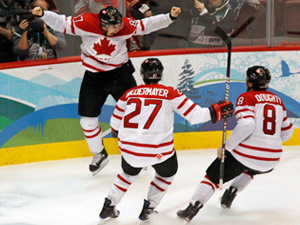 Sreesha Vaman
Sreesha Vaman
Olympics Hockey Gold Medal Game, February 28, 2010
We were the upstart Americans, thirsting for payback from losing the 2002 medal to Canada. We had defeated Cocky Canada in the round robin, sheer determination triumphing over superior skill. When Zach Parise scored with 28 seconds left to send the game into overtime, I thought the tide had finally turned the USA’s way. We believed. We prayed. We hoped. And we cried when Sidney Crosby snuck one in past Ryan Miller to give Canada the gold. It figures that it would be Crosby, who had a terrible Olympics but was lauded as a “hero” because of that one goal, and who has all the skill in the world but has as much personality as a dry piece of stale bread that’s been sitting in the cold toaster oven for six hours. The one bright spot was how much support the U.S. team got: The TV ratings were the second-highest of any genre all year behind the Super Bowl, and the topic dominated talk shows—I distinctly remember Craig Ferguson shaking his fist at the camera and vowing to win gold in 2014.
Now it’s your turn: What is your most heartbreaking moment in sports? Leave a comment and let us know.
